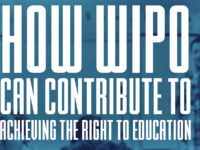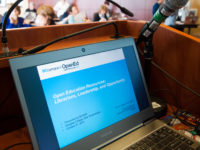Prime Minister Justin Trudeau met earlier this week with Jean-Francois Gagné, the CEO of Element AI, the Montreal-based applied artificial intelligence lab. Trudeau tweeted that the two men “talked about what Canadians are doing in AI in Montreal & across the country, and how we can keep the industry thriving.”
Post Tagged with: "fair dealing"
Separating Fact From Fiction: The Reality of Canadian Copyright, Fair Dealing, and Education
This week, I had the honour of speaking at a packed event at the World Intellectual Property Organization titled How WIPO Can Contribute to Achieving the Right to Education. The panel featured speakers from around the world focusing on the copyright-related education issues. My talk, which used emerging data from the copyright review, focused on the reality of Canadian copyright, fair dealing, and education. A recording of my remarks embedded into my slide presentation is posted below in a YouTube video.
Canadian Copyright, Fair Dealing and Education, Part Four: Fixing Fair Dealing for the Digital Age
My series on Canadian copyright, fair dealing, and education has explored spending and revenue data at universities and publishers, explained the diminishing value of the Access Copyright licence, and conducted a detailed analysis of site licensing on Canadian campuses which demonstrates the foundation for accessing works are the site licences that offer greater flexibility and value than the Access Copyright licence. The series has also shown how some of the publishers who have been most critical of fair dealing are also the ones that have benefited the most from licensing their e-books to educational institutions.
Canadian Copyright, Fair Dealing and Education, Part Three: Exploring the Impact of Site Licensing at Canadian Universities
My series on Canadian copyright, fair dealing, and education has thus far explored spending and revenue data at universities and publishers as well as explained why the Access Copyright licence is diminishing in value. This post provides original data on the impact of site licensing at universities across Canada. It is these licences, together with open access and freely available online materials, that have largely replaced the Access Copyright licence, with fair dealing playing a secondary role. Site licensing now comprises the lion share of acquisition budgets at Canadian libraries, who have widely adopted digital-first policies. The specific terms of the licences vary, but most grant rights for use in course management systems or e-reserves, which effectively replaces photocopies with paid digital access. Moreover, many licences are purchased in perpetuity, meaning that the rights to the works have been fully compensated for an unlimited period. The vast majority of these licenses have been purchased since 2012, yet another confirmation that fair dealing has not resulted in less spending on copyright works.
Canadian Copyright, Fair Dealing and Education, Part Two: The Declining Value of the Access Copyright Licence
The Standing Committee on Industry, Science and Technology copyright review has focused exclusively on fair dealing and education to date, hearing from a broad spectrum of witnesses that education spending on licences has increased since 2012, that publisher profit margins have gone up during the same time period, and that distributions from the Access Copyright licence have declined. As discussed in yesterday’s post, the data points to the changing realities of access to materials with site licensing now constituting the majority of electronic reserves followed by open access or freely available online materials. Schools are also collectively spending millions of dollars on transactional licensing that grants access to specific works as needed. The role of fair dealing is relatively modest, reflecting a small part of overall access to materials.
The availability of alternative licences that offer better value than the Access Copyright licence lies at the heart of the decline in Access Copyright distributions.











